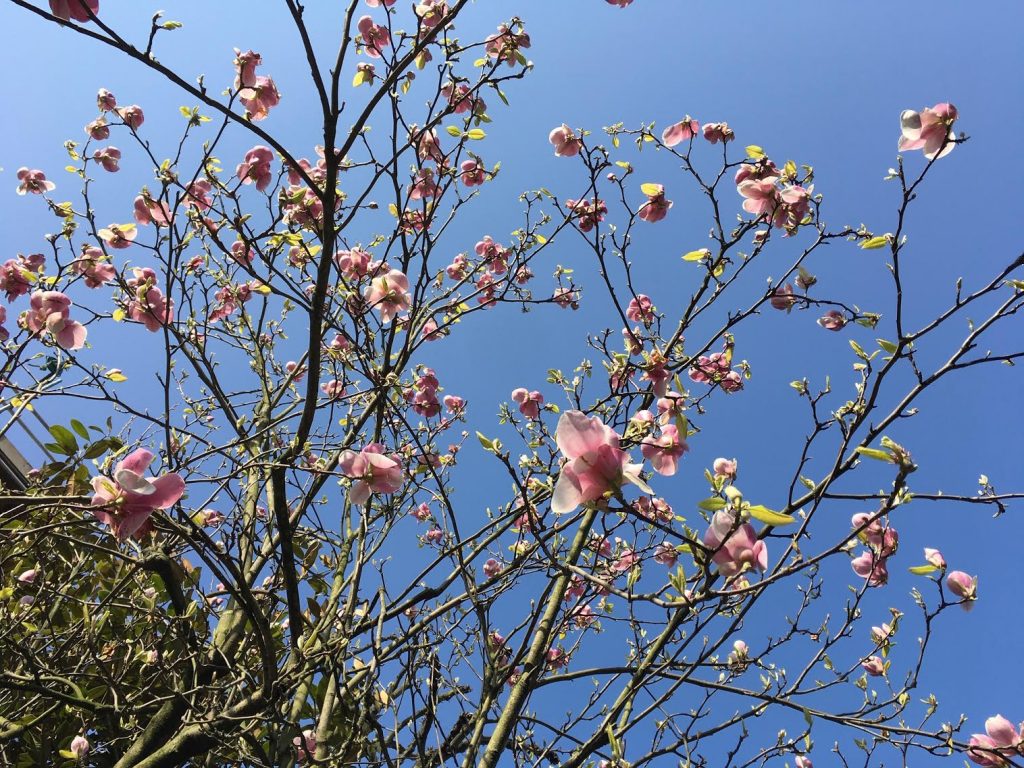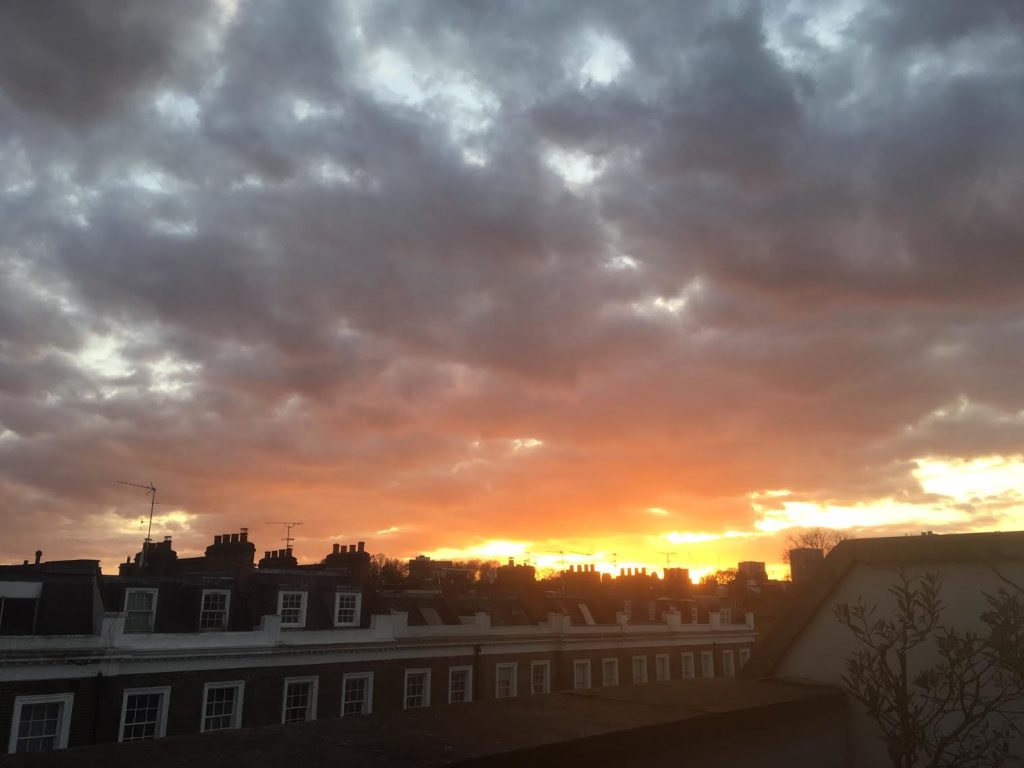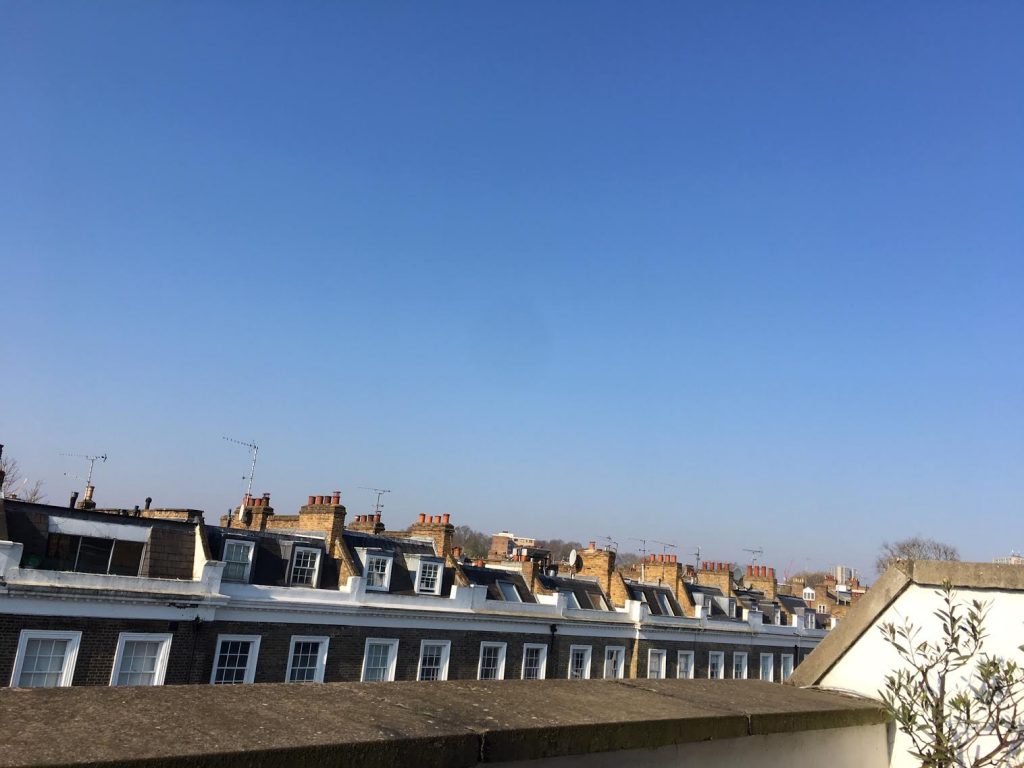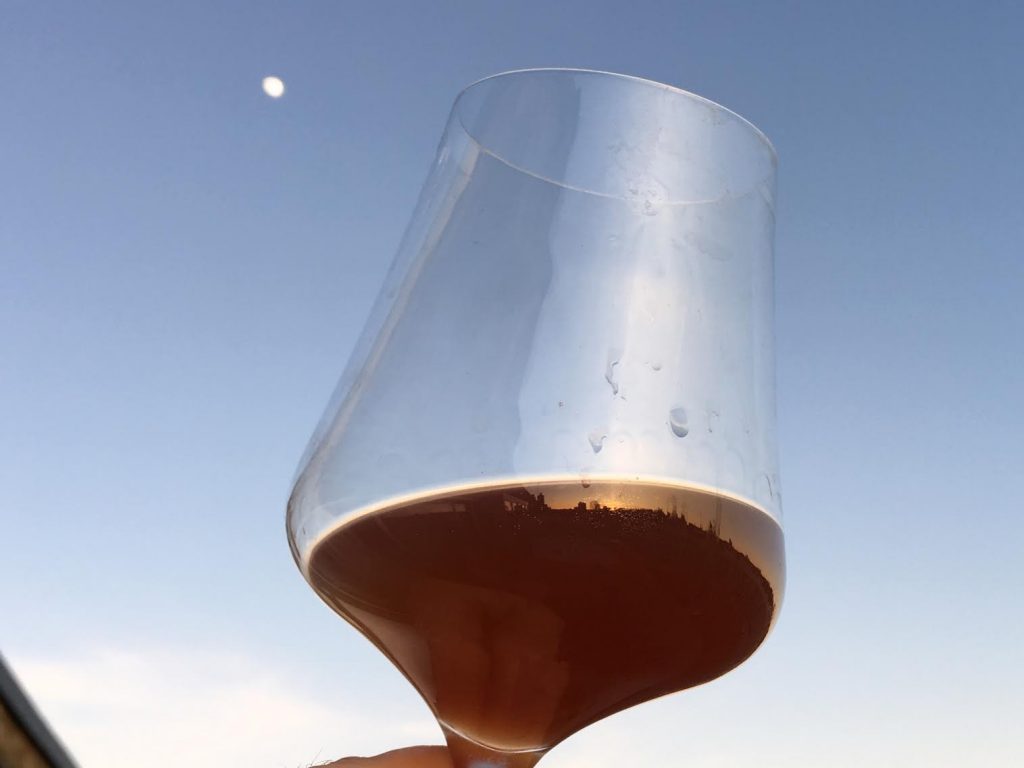
March
I always start writing projects way after the event. So, here am I sitting on the sofa, thirty pages into Bleak House and determined not to skip a page, but struggling to focus. I am of the generation that is bewitched and transfixed by the laptop screen. The emptier it is, the emptier my mind is. It would be a kind of zen enrichment except that this emptiness is a kind of exhausting aridity. I am summoned to attention by the most trivial e-mails, driven to delete spam rather than let it sit corrupting my pristine i n-box. I need to get a life – of the mind – and shun sublunary distractions.
I have decided to record roughly, very roughly, some thoughts about the lockdown. Suffice to say, it has been a slow rollercoaster of emotions, or more like a fermentation that starts quickly and then settles. Now I am at the stage of “maturing” ambiently, housed in a newly-enforced routine.
My first thought was not an uplifting one or even an existential one, but simply this: “I really should have got that haircut last week”. Regrets and split ends, I have had a few. The prospect of turning into even more of a Worzel Gummidge (for our younger viewers that was a children’s TV programme in the late 70s-early 80s about the adventures of a scarecrow played by Jon Pertwee) was alarming, until I realised that no-one that I knew would actually see me sporting my dragged-through-a-hedgerow-backwards coiffure. Until Zoom arrived into our lives and exposed a many a hair-untrained mullet.
Coronavirus. Corona – a crown, a ring, a brand of cheap beer. There were a lot of corona-related jokes at the beginning. It sounded innocent enough; there was even a name for it, and the naming of things is what theoretically gives mankind dominion over them. When you hear and read about such infectious diseases though, they are usually something that happen to other people in distant countries. Who, after all, can but dimly visualise what is going in a province in China? Despite globalisation, we are still not really that connected to other countries and their cultures. Sometimes we’re not even aware of what is going on in our backyard. Now airborne viruses can catch cheap flights inside their human hosts and be in every part of the world in an instant. Within a few weeks 213 countries would be recording infections and fatalities. Including the magical-mythical Saint Pierre Miquelon (has pin, needs map). Eventually, the word Covid-19 would be as common in conversation as “hello”, accompanied by “lockdown”; “crisis”; “social distancing” and “pandemic”, would dominate and define our lives as if we were in a world war and had entered a state of siege.
Somewhere in the middle of the story of Bleak House the odious Krook spontaneously combusts.
History ceased. It didn’t really. Nice to throw in a tangential reference to Francis Fukuyama though. All news was corona-news; every single happening viewed through the prism of the virus. If there was a prelapsarian life before the advent of Covid-19 we certainly couldn’t recall it. The public were demanding clarification on whether these times were unprecedented – or merely unparalleled. Welcome to tabula rasa country. Every newspaper article explored not just the physical virus but its social, economic, and political ramifications. Every day more predictions; we were either going to hell in a handcart or the way we were going the other way. Well, just the former. Scientists paraded before us like high priests and we hung on their every prognostication. Doomy news intoned in a gloomy voice was reassuring, as solemnity seems to betoken authority. We trust a Private Fraser more than a Corporal Jones in these times.
Amongst the commentariat the phrase existential crisis cropped up repeatedly. And not just relating to my lack of haircut. There has been a lot of discussion about how the spread of the virus might be a kind of warning to mankind, a portent or forerunner of an even greater crisis, namely climate disaster, and that nature, for the sake of nature, would find a way of culling pestilential humankind. No doubt, Mayan Nostradomuses (Nostrodami?) are, even now, scrambling in their various temples, consulting and reinterpreting ancient numerological predictions to fit the apocalyptic 2020 reality. (I exaggerate a wee bit.)
The flipside was to look at this as just another fine mess. Not as bad as the Spanish flu, but worse than the normal winter ones. Some governments went into complete denial, others saw only silver linings, where we saw only clouds.
As we come to the end of another week in the Covid-19 saga [mid-March – Ed], it seems that many of us have been experiencing a wide range of emotions. After the total sense of loss and dislocation of the first week and the massive uncertainty that suddenly beset us, many of us are beginning to establish some sort of routine and beginning to come to terms with the changes.

Our initial human response to the crisis revealed how much we depended on comfortable routine. We assume, for example, that shops will always be open with shelves stacked not just with the necessities of life, but the particular brands that we have come to rely on. Without even the little certainties, we begin to think the unthinkable. What if we run out of food – we will starve. And so we hoard like busy squirrels preparing for winter. Hand sanitiser became dearer to us than art, literature, music or sport. And toilet paper? Well, the hoarding memes became an art form in itself. Meanwhile, barricading oneself in with a roomful of toilet paper, dried pasta and tinned food created a comfortable bunker mentality. Witnessing others panic results in panic. You ask yourself why you are not panicking and begin to lose confidence in the system. Lack of confidence leads to anxiety. Anxiety leads to fear. Fear develops into a wider sense of insecurity – our jobs, our pensions, our ability to pay our mortgages or rent, the fear that the very reason why we get up in the morning and go to work, is being undermined and crushed by a force beyond our comprehension.
Many of these are not just first world problems, but elite premier league first world problems. I remember a few years ago our local farmers’ market closed for a couple of weeks. I saw an elderly dowager approach a stand selling buffalo-related products – mozzarella, air-dried charcuterie and say in her best stentorian: Where have you been? I have had to endure two weeks without my buffalo milk!” Imagine that being said by Dame Edith Evans channelling her Lady Bracknell and you will imagine the strato-indignation.
We all rely on structure if not on regular supplies of buffalo milk. When banks are in crisis, people run to withdraw their money, thereby exacerbating the crisis. When there is a petrol shortage, we queue up at the pumps and fill our cars to the max. Individualism triumphs over collective responsibility. It is easy enough to rationalise selfish behaviours, but when everyone is out for him-or-herself, then the principles of mutualism upon which enlightened societies are based, are completely undermined. That is one default aspect of human nature. There are others.
One writer explained it thus:
The chain of ‘uncertainty = anxiety = fear’ events galvanises the reptilian part of our brain, the amygdala, into action. Apparently when faced with a situation that the brain decides is dangerous, we default to a “fight-flight-freeze” reaction. All well and good for our Neanderthal antecedents staring down a sabre-toothed tiger but unfit for purpose in the 21st century world. Hence the panic buying of commodities in plentiful supply, locking oneself away in the cottage in Wales, or studiously ignoring the global pandemic.
A time to grieve
When global circumstance impacts on our personal lives, we experience a momentary existential panic and multiple types of grief. We feel the world has changed, and it has. We know this is temporary, but it doesn’t feel that way, and we realise things will be different. Just as going to the airport is forever different from how it was before 9/11, things will change and this is the point at which they changed. The loss of normalcy; the fear of economic toll; the loss of connection. This is hitting us and we’re grieving. Collectively. We are not used to this kind of collective grief in the air.

Our family is grieving. They may express it in different ways, communicating a lack of energy or a helplessness, or throw themselves into meaningless activity, or whistle “Always look on the bright side of life.” Some are stirred into action; with their innate survivor mentality the toughminded get going. For them, grief is a waste of valuable energy.
Anticipatory grief is the mind going to the future and imagining the worst. To calm oneself it is necessary to return to the present. This will be familiar advice to anyone who has meditated or practiced mindfulness but people are always surprised at how prosaic this can be. You can name five things in the room. There’s a computer, a chair, a picture of the dog, an old rug and a coffee mug. It’s that simple. Breathe. Realize that in the present moment, nothing you’ve anticipated has happened. In this moment, you’re okay. You have food. You are not sick. Use your senses and think about what they feel. The desk is hard. The duvet is soft. I can feel the breath coming into my nose. This really will work to dampen some of that pain. Mindfulness assuages panic.
But have we not gained other things? Human beings are adaptable. We establish new routines, and in the words of the poster “Keep Calm and Carry On.” We do the things that we have promised we would always do, if we but had the time. We may start to read the books that we said we would. If we are not ransacking the shelves and steamrolling old ladies in our noble quest for hand sanitiser, we shop more thoughtfully. We improvise meals around what is available. We learn how to bake bread, and if we knew how to already, we bake even more and let the world know that our sourdough culture has worked! We go for walks, spend more time in the garden, listen to music with greater pleasure, interact with our children. Small pleasures become intensified. Blessings are counted.
Today, the lockdown begins. We won’t be seeing our family, friends and work colleagues for weeks, maybe months. Ok, I should write a book – a double magnum opus (would that be a jeroboam opus?), learn how to bake bread as per above and then teach that skill to my children so that I don’t have to, start a new hobby, do a home fitness regime, practise mindfulness, get involved with politics remotely. All that.
On the bread front, it so happened that my daughter had some French homework, which involved translating a recipe for a traditional French baguette and then making it. One of the ingredients that puzzled us was l’eincre de seche, which I fondly imagined was a kind of fancy French salt, but turned out to be cuttlefish ink. Trad baguette with ink?? And nigella seeds were another odd addition to the recipe. I had to check the calendar to see if it was a poisson d’avril. So sans ink, mais avec nigella’s favourite seeds, we kneaded the good knead and popped the mini baguettes into the oven. They dutifully baked and came out like wooden truncheons, albeit speckly ones. I couldn’t understand why until I looked at the yeast packet and discovered that there was a sell-by date of 2015! In short, the yeast was deceased!
Back in the outside world, restaurants, hotels, pubs and bars had closed and millions of staff were placed on furlough schemes. There was a single intervening day when retailers were on tenterhooks, unsure whether wine, beer and spirits, constituted a food stuff, one of life’s true essentials. It was, as it happened and, reassured, they went about repurposing their businesses, either creating, or strengthening, an on-line presence. If you couldn’t go to wine, then wine could surely come to you. It was tough, but rewarding work and placed the independent retailers at the heart of their communities. Some pubs, wine bars and local restaurants also improvised and began to rejig their offering, becoming de facto farm and bottle shops. Napoleon characterised England as a nation of shopkeepers. No, it was more like a nation of deli owners or gazpacho-dispatchers as I call them.
One of the by-products of lockdown is that we are drinking better. Wisely and well, not just in more copious quantities. For example, I am buying and drinking wines that I would normally only broach on very special occasions. Devil hang the expense. Slowing down also means that I can take pleasure in every aspect of the wine. When I pour it, I allow myself to examine the colour in the glass, as if admiring it for the first time. The greater the depth of colour, the more immersive the visual experience. I take time to smell, to taste, to savour, allowing the wine to envelop my senses, rather than chasing after it, so to speak. It is like remembering how to breathe.

During March I treated myself to the following bottles (amongst others):
Champagne Marie-Courtin Allegiance Brut Nature
A wondrous onion-skin-hued Pinot Noir champagne from biodynamically farmed vines.
Champagne Marie Courtin Indulgence Brut Nature
Another ruby gem from Dominique Moreau, also Pinot Noir massale selection, more red fruits, delicious.
Foradori Lezer, Trentino
Foradori’s wine of the people, packed with sappy fruit, Teroldego every which way with juice.
Bruno Schueller Pinot Blanc, Alsace
A lava lamp of turbo-turbidity and skin contact. Wild yet moreish.
Bruno Schueller Riesling Grand Cru Pfersigberg (2013), Alsace
The Dr Jekyll to the above Schueller-Hyde. Refined, precise, delicate and good-mannered.
Dard & Ribo Hermitage Blanc, N Rhone
Golden, honeyed, lanolin, herbs and spice. Just dreamy.
Dard & Ribo Crozes-Hermitage Rouge Les Pins, N Rhone
The art of rotundone. Bristling with dark blackberry and currant fruit, rasping cracked black pepper notes. From the powerful 18 vintage.
In normal times, I tend to mix up my drinking, but from the end of March onwards I was entirely governed by the elements in terms of my choice of wine. Where there were fiery sunsets, it had to be flaming orange wine whereas brilliant blue skies and sharp light invoked a need for roses, pet nats, and, in particular, rose pet nats. And the weather was stuck in this heavenly mode day-after-day, week-after-week, what I lost in social touching, I gained in terms of (wine) skin contact!
To be continued…
*
Interested in finding more about the wines mentioned? Contact us directly:
shop@lescaves.co.uk | sales@lescaves.co.uk | 01483 538820
*Note: We are still open for business, doing deliveries, and keen to help everyone with their booze needs in this difficult time. Natural wine lovers can visit our online shop and order online!

